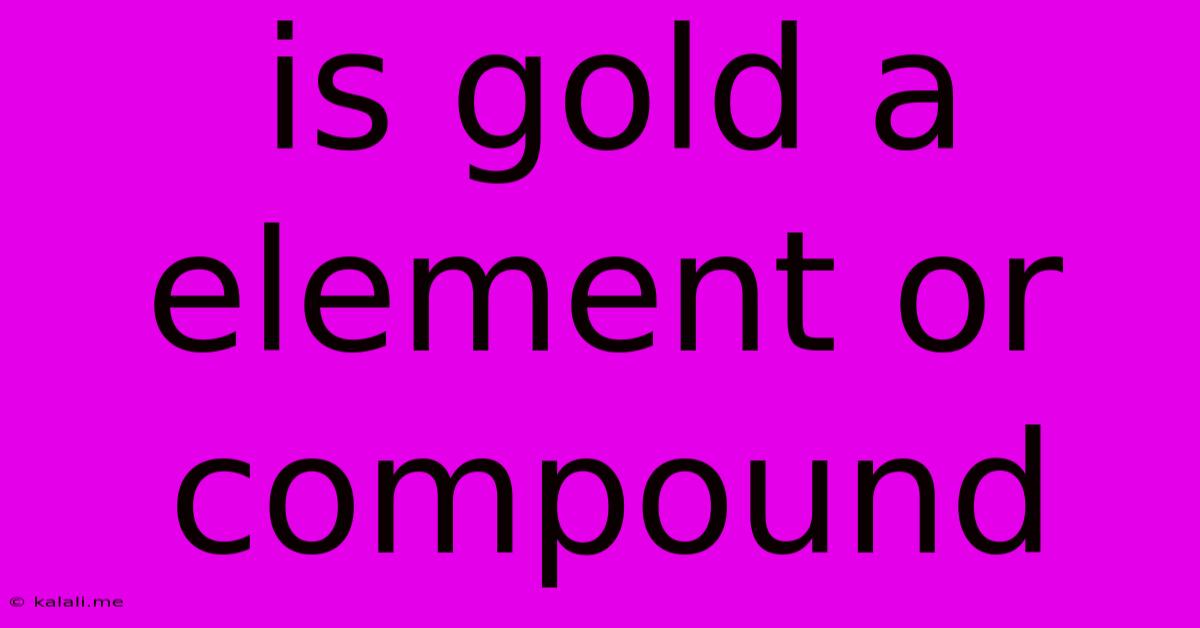Is Gold A Element Or Compound
Kalali
May 10, 2025 · 3 min read

Table of Contents
Is Gold an Element or a Compound? A Definitive Answer
Meta Description: Confused about whether gold is an element or a compound? This article provides a clear and concise explanation, exploring the fundamental differences between elements and compounds and clarifying gold's place in the periodic table. Learn about gold's atomic structure and its unique properties.
Gold, a precious metal coveted for its beauty, rarity, and versatility, is often a subject of discussion, particularly when it comes to its classification in chemistry. Many wonder: is gold an element or a compound? The answer is simple and definitive: gold is a chemical element.
This article will delve into the fundamental differences between elements and compounds and explain why gold unequivocally falls under the category of an element. We will also explore some of gold's key properties that stem from its elemental nature.
Understanding Elements and Compounds
Before we definitively classify gold, let's establish a clear understanding of the terms "element" and "compound."
-
Element: An element is a pure substance consisting only of atoms that all have the same number of protons in their atomic nuclei. This number is known as the atomic number and uniquely identifies each element. Elements are the fundamental building blocks of all matter. They cannot be broken down into simpler substances by chemical means. Examples include hydrogen (H), oxygen (O), and iron (Fe).
-
Compound: A compound is a substance formed when two or more chemical elements are chemically bonded together. These bonds involve the sharing or transfer of electrons between atoms. Compounds have different properties than the individual elements that make them up. Examples include water (H₂O), salt (NaCl), and carbon dioxide (CO₂).
Gold's Atomic Structure and Classification
Gold, denoted by the symbol Au (from the Latin word aurum), has an atomic number of 79. This means that every gold atom contains 79 protons in its nucleus. These protons are balanced by 79 electrons orbiting the nucleus. Gold atoms can also contain varying numbers of neutrons, leading to different isotopes of gold. However, the defining characteristic, the 79 protons, remains constant.
Because gold consists only of atoms with 79 protons, and it cannot be broken down into simpler substances through chemical reactions, it unequivocally fulfills the definition of a chemical element. It's found in its pure metallic form in nature, though often mixed with other elements and minerals.
Gold's Unique Properties as an Element
Many of gold's desirable properties, such as its malleability, ductility, and its characteristic yellow color, are directly related to its atomic structure and elemental nature. These properties make it ideal for various applications, including jewelry, electronics, and investment.
- Malleability: Gold can be easily hammered or pressed into thin sheets.
- Ductility: Gold can be drawn into thin wires.
- Conductivity: Gold is an excellent conductor of electricity and heat.
- Inertness: Gold is relatively unreactive, meaning it doesn't readily react with other elements. This contributes to its durability and resistance to corrosion.
Conclusion
In summary, the question "Is gold an element or a compound?" is answered decisively: gold is an element. Its unique atomic structure, consisting solely of atoms with 79 protons, and its inherent properties, firmly place it within the category of elements on the periodic table. Understanding this fundamental classification helps us appreciate the remarkable properties of this valuable and fascinating metal.
Latest Posts
Latest Posts
-
What Is 20 Percent Of 800 000
Jul 12, 2025
-
Words That Start With Y In Science
Jul 12, 2025
-
Prevent An Expressway Emergency By Merging Without
Jul 12, 2025
-
How Many Grams Of Sugar In A Pound
Jul 12, 2025
-
7am To 11am Is How Many Hours
Jul 12, 2025
Related Post
Thank you for visiting our website which covers about Is Gold A Element Or Compound . We hope the information provided has been useful to you. Feel free to contact us if you have any questions or need further assistance. See you next time and don't miss to bookmark.